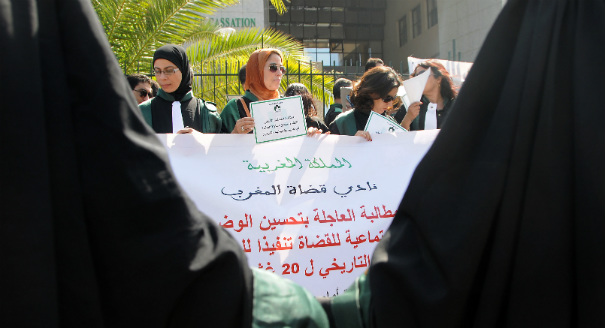On October 7, Morocco transferred the office of the public prosecution from the Ministry of Justice, part of the executive branch, to the Court of Cassation, part of the judicial branch. This move is more than just a superficial reshuffling, but rather signals the end of an era of tight executive oversight of the public prosecution, which it has controlled since 1956.
This move stems from decades of regular calls for judicial reform from both civil society and government, including from within the institution of the public prosecutor. The Arab Spring and the February 20 protest movement hastened these calls for judicial reform, and the king agreed to some of the demonstrators’ demands during his famous March 9, 2011 speech. This was followed by constitutional reforms on July 1, 2011, which expanded the authority of the High Judicial Council and reshaped it to include non-judges. The reforms also emphasized fair trials and litigants’ rights for the first time.
But as soon as the first post-Arab Spring government was installed after the parliamentary elections of November 25, 2011, disagreements surfaced anew over whether the public prosecution, led by the attorney-general, should be independent of the executive branch. Supporters of the idea argued this was in accordance with the judicial branch’s role in the new constitution. Opponents countered that it needed to remain part of the executive branch to ensure parliamentary oversight. After over five years of debate, Law 106-13 was passed in March 2016, paving the way for the recent transfer of the office out of the Ministry of Justice, as recommended by the Commission of the National Dialogue on Comprehensive Reform of the Justice System, which sought input from civil society and other stakeholders in the judiciary. However, implementation of this law took a year because it was dependent on the inauguration of the High Judicial Council, whose members were not appointed until April 7, 2017.
Supporters of the law, mainly judges, rights activists, and academics, argued that giving the public prosecution independence from the Ministry of Justice was a necessary step toward total judicial independence that would pave the way to begin thinking about legal and institutional mechanisms to ensure accountability and oversight for the prosecution. The 2011 Constitution had clearly established a separation of powers, with Section 7 on the judicial branch not distinguishing between court judges and the public prosecution, which oversees the Moroccan police in investigating crimes and trying the accused—unlike many legal systems around the world where the public prosecutor is not considered part of the judiciary. The independence of the public prosecution would safeguard it from the political sway wielded by the Ministry of Justice, which can potentially be influenced by the political party that holds the post and the parliamentary majority that backs it.
Moreover, proponents of the reform argued that a public prosecution under the judiciary would be more effective than it had been under parliament. Although parliament in theory had oversight of the public prosecution, it never actually exercised this authority, nor has any minister of justice ever resigned over the office’s mistakes. Under the new law, the High Judicial Council—which consists of elected judges, senior judges from other bodies, as well as five independent members directly appointed by the king—can and likely will hold members of the public prosecution accountable for their professional mistakes, as stipulated by the Statute for Judges. To complement the new constitution’s guarantee of litigants’ right to receive compensation in case of legal errors, the court judges will also provide subsequent judicial oversight over the public prosecution. Furthermore, the new law requires the public prosecutor to draft annual reports to be published in the official gazette, thus allowing civil society and the media to play a watchdog role. This is an important mechanism that can promote the people’s oversight over public policies in Morocco in general.
Opponents of the independence of the public prosecution are mostly politicians, particularly within the 2011-2016 ruling coalition in the House of Representatives, as well as some professional associations in which many members have political affiliations. For example, although the Morocco Bar Association has called for the full independence of the judiciary from the Ministry of Justice throughout its history, in 2013 it vaguely called for keeping the public prosecution, temporarily, under the authority of the Ministry of Justice.
The opponents of the independence of the public prosecution argued that the 2011 constitution, even though it did include several requirements concerning the independence of the judicial branch, was referring to court judges, not the public prosecutor. Article 110 stipulates that “The prosecuting magistrates must apply the law and must conform to written instructions, conforming to the law, emanating from their hierarchic authority.” This does not specify whether that authority is judicial or executive, but rather leaves it to be determined by separate laws.
More significantly, they argued that having the public prosecution independent from the executive branch will obstruct implementing policies the government sets on crime, as it would no longer have the legal means to oblige the attorney-general to enforce them. Under the new law, the attorney-general is a judicial figure directly appointed by the king, and as such cannot be summoned by parliament for questioning, as this would be contrary to judicial independence. The minister of justice, who formerly oversaw the office, can be brought before parliament at any time and, as a member of a political party appointed by elected officials, is also accountable to the public via parliamentary elections.
Now that the independence of the public prosecution has been implemented, it remains to be seen whether the body can strike a balance between protecting human rights and freedoms while cracking down on crime and corruption through transparent, fully constitutional, and legal measures that follow international best practices on public prosecution work.
* This article was translated from Arabic.
Abdellatif Chentouf is a Moroccan judge and professor at the Faculty of Law in Rabat and Sala, and is head of the Morocco Judges’ Club.





.jpg)
